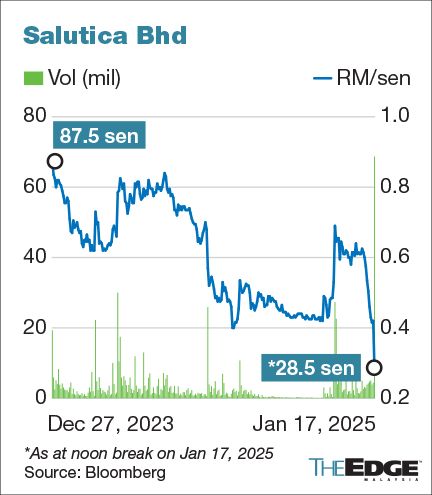
KUALA LUMPUR (Jan 17): Shares of Salutica Bhd (KL:SALUTE) fell to their lowest in nearly two years after the company lost its suit against Apple Malaysia Sdn Bhd in the Kuala Lumpur High Court.
The High Court has ordered its wholly owned subsidiary Salutica Allied Solutions Sdn Bhd to pay Apple Malaysia the counterclaim of RM1.2 million, the company said in a bourse filing.
Salutica will obtain the grounds of judgement to study and seek further advice from solicitors, its managing director Joshua Lim told The Edge. The company hopes to get the grounds "in one or two weeks' time", he added.
In January 2022, Salutica initiated a patent infringement lawsuit against Apple Malaysia, accusing the company of infringing on patents related to CrossPair Technology.
Salutica tumbled as much as 45% on Bursa Malaysia to 23 sen, its lowest since March 3, 2023, in the morning trading session. The sharp decline triggered the suspension of intraday short selling of the electronics manufacturing services firm’s stock.
The stock settled at 28.5 sen at the midday trading break, giving the company a market capitalisation of RM122 million. Trading volume totalled 70.1 million shares, nearly 30 times its 200-day average volume of 2.35 million shares.
Intraday short selling will be suspended when the last price of an approved stock falls more than 15%, or 15 sen for those under RM1, from the previous day’s price. Intraday short selling of Salutica shares will only be allowed to resume next Monday (Jan 20).
Loss-making Salutica is 50.6%-controlled by Ocean Enlightenment Sdn Bhd, a family vehicle held by Joshua Lim and his father James Lim Chong Shyh, the former chief executive officer of Salutica.
For its first financial quarter ended Sept 30, 2024, Salutica widened its net loss to RM8.83 million from RM5.49 million a year earlier, as revenue dropped 49.85% to RM3.65 million from RM7.27 million.
The group attributed the lower earnings to higher costs incurred from holding excess resources pending mass production approval for new projects that are still in the product development stage, as well as low production volumes of existing products.

